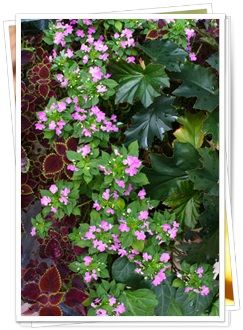


Organics is the oldest form of gardening...and the newest!
 Many people buy organic food because they donít want to ingest poisons. This is probably a great idea, but what about being surrounded by poisons? That is exactly what happens when your landscaper sprays for weeds or insects with most synthetics poisons. They create a barrier you have to pass through to get into your house, and once these pesticides get inside you house, there is no bacteria to break down the compounds and they can persist inside a house much longer, than say, on your lawn.
Many people buy organic food because they donít want to ingest poisons. This is probably a great idea, but what about being surrounded by poisons? That is exactly what happens when your landscaper sprays for weeds or insects with most synthetics poisons. They create a barrier you have to pass through to get into your house, and once these pesticides get inside you house, there is no bacteria to break down the compounds and they can persist inside a house much longer, than say, on your lawn.
The most frightening part, your landscaper does not need to inform you of what he is applying and when he has applied it, so your only warning may be a strange smell or funny looking residue.
Now what about our environment? These poisons get into our lakes, rivers, steams and ground water, often off-setting the delicate balance of our soils, called the soil food web. All because we cannot tolerate a few weeds in our lawn.
The difference between organic versus synthetic lawn care:
- With organic care, you prevent problems by optimizing plant ecosystems above
and bellow the ground - With synthetic care, you apply pesticides to control the symptoms of poor
ecosystems, never getting to the cause
 Organic fertilizer is broken down and stored by the soil biology, which in turn, feeds the plants. In order for this process to work, you first need to have healthy, active soil. Pesticides and synthetics kill soil biology and change chemistry. Normally, it would take approximately two years for soils to recover. By applying liquid compost, we can restore the soils chemistry and biology much quicker, usually in four to eight weeks. Once your landscape has recovered, it will be able to resist fungi and pests naturally.
Organic fertilizer is broken down and stored by the soil biology, which in turn, feeds the plants. In order for this process to work, you first need to have healthy, active soil. Pesticides and synthetics kill soil biology and change chemistry. Normally, it would take approximately two years for soils to recover. By applying liquid compost, we can restore the soils chemistry and biology much quicker, usually in four to eight weeks. Once your landscape has recovered, it will be able to resist fungi and pests naturally.
The difference between organic versus synthetic landscape care
- Organic care helps prevent problems by optimizing plant conditions
- Synthetic care works by apply pesticides to control the symptoms of poor cultural
or practices
Commonly Asked Questions
Q: How long will it take for organics to work?
A: With the use of liquid compost, you may see a difference the same year
Q: What is compost tea?
A: It is the extracting and growing the biology of compost in a well aerated and temperature controlled environment
Q: Why do you need a plant health care company if your property already looks good?
A: We remove leaf litter each fall that would normally be broken down by fungi and restore soil nutrients and chemistry. Without this process, landscapes and soils will slowly starve

 Daventry Web Design
Daventry Web Design